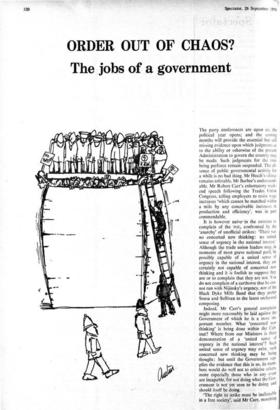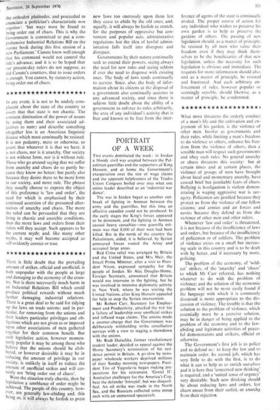ORDER OUT OF CHAOS?
The jobs of a government
The party conferences are upon us; the political year opens; and the coming months will provide the essential but still missing evidence upon which judgments as to the ability or otherwise of the present Administration to govern the country may be made. Such judgments for the time being perforce remain suspended. The ab- sence of public governmental activity for a while is no bad thing. Mr Heath's silence remains tolerable, Mr Barber's understand- able. Mr Robert Carr's exhortatory week- end speech following the Trades Union Congress, telling employers to resist wage increases 'which cannot be matched within a mile by any conceivable increases in production and efficiency', was in part commendable.
It is however naive-in the extreme to complain of the Tuc, confronted by the `anarchy' of unofficial strikes: 'There was no concerted new thinking: no united sense of urgency in the national interest.' Although the trade union leaders may, in moments of most grave national peril, be possibly capable of a united sense of urgency in the national interest, they are certainly not capable of concerted new thinking and it is foolish to suppose they are or to complain that they are not. You do not complain of a carthorse that he can- not run with Nijinsky's urgency, nor of the Black Dyke Mills Band that they prefer Sousa and Sullivan to the latest orchestral composing.
Indeed, Mr Carr's general complaint might more reasonably be laid against the • Government of which he is a most im- portant member. What 'concerted new thinking' is being done within the Cab- inet? Where from our Ministers is there demonstration of a 'united sense of urgency in the national interest'? Such united sense of urgency may exist, such concerted new thinking may be being thought: but until the Government sup- plies the evidence that this is so, its mem- bers would do well not to criticise others. more especially those who in any event are incapable, for not doing what the Gov ernment is not yet seen to be doing, and should itself be doing. 'The right to strike must be inalienable in a free society', said Mr Carr, mouthing the orthodox platitudes, and proceeded to enunciate a politician's characteristic non sequitur: 'but ways must be found to bring order out of chaos. This is why the Government is committed to put a com- prehensive Industrial Relations Bill on the statute book during this first session of a new Parliament.' Canute knew well enough that his command would not control the tide's advance; and it is to be hoped that our present-day rulers do not suppose, as did Canute's courtiers, that to issue orders is enough. You cannot, by statutory action, bring order out of chaos.
******************1 In any event, it is not to be unduly com- placent about the state of the country to assert that that state is not chaotic. The constant diminution of the power of nouns by using them and their associated ad- jectives to name and describe something altogether less is an American linguistic disease which must continually be resisted. It is not pedantry, mere or otherwise, to assert that whatever it is that we have, it is not chaos, nor is it anarchy. Our society is not without form, nor is it without rule. Those who go around saying that we suffer from anarchy and chaos do so partly be- cause they know no better; but partly also because they desire there to be more form in our society, and more rule. The phrase they usually choose to express the object of this preference is law and order', the need for which is emphasised by their continued assertion of the presumed alter- natives of anarchy and chaos. The more the ruled can be persuaded that they are living in chaotic and anarchic conditions, then the more laws and orders from their rulers will they accept. Such appears to be the current myth; and, like many other myths, it may well become accepted as self-evidently correct or true.
******************1 There is little doubt that the prevailing amount of strikes, official and unofficial, is both unpopular with the people at large and damaging to the economy of the coun- try. Nor is there necessarily much harm in an Industrial Relations Bill which could produce political rewards without much further damaging industrial relations. There is a great deal to be said for tidying up the laws on trade unions; and in par- ticular, for removing from the unions and their leaders particular privileges and ob- ligations which are not given to or imposed upon other associations of men gathered together for their common benefit. But such legislative action, however momen- tarily popular it may be among those who believe that the unions should be clob- bered, or however desirable it may be in reducing the amount of privilege in our society, is unlikely in itself to reduce the amount of unofficial strikes and will cer- tainly not 'bring order out of chaos'. Were the situation truly chaotic, then by legislation a semblance of order might be achieved. The people of this country. how- ever, are generally law-abiding and, this being so, it will always be foolish to press new laws too onerously upon them lest they cease to abide by the old ones; and, equally, it will always be foolish to stretch. for the purposes of oppressive but con- venient and popular acts, administrative regulations lest the idea of lawful admin- istration falls itself into disrepute and disrepair.
Governments by their nature continually seek to extend their powers, seeing always the need for new rules and seeing seldom if ever the need to dispense with existing ones. The body of laws tends continually to accrete. Since, also, the body of infor- mation about its citizens at the disposal of a government also continually accretes in any advanced society, and since there is seldom little doubt about the ability of a government to enforce its rules arbitrarily, the area of any individual's activity that is free and known to be free from the inter- ference of agents of the state is continually eroded. The proper course of action for any individual who wishes to preserve his own garden is to help to preserve the gardens of others. The passing of new legislation should, as a matter of principle. be resisted by all men who value their freedom even if they may think them- selves to be the beneficiaries of that new legislation, unless the necessity for such legislation is obvious and immediate. The requests for more information should also. and as a matter of principle, be resisted and frustrated. And each arbitrary en- forcement of rules, however popular or seemingly sensible, should likewise, as a matter of principle, be condemned.
******************1 What most threatens the orderly conduct of a man's life and the cultivation and en- joyment of his garden. is the violence of other men. Insofar as governments and their rules, while limiting a man's freedom to do violence to others, enhance his free- dom from the violence of others, then a sensible man will respect such governments and obey such rules. No general anarchy or chaos threatens this society: but at certain times and at certain places, the violence of groups of men have brought about local and momentary anarchy, have caused brief but justifiable fears of chaos. Bullying is hooliganism is violent demon- strating is waging aggressive war is sav- agery. Policemen are justified because they protect us from the violence of our fellow citizens; and armies and air forces and navies because they defend us from the violence of other men and other rulers.
Whenever law and order' is threatened, it is not because of the insufficiency of laws and orders, but because of the insufficiency of policemen or of soldiers. The problem of violence exists on a small but increas- ing scale in this country and is to be dealt with by better, and if necessary by more, policing.
The problem of the economy, of 'wild- cat' strikes, of the 'anarchy' and 'chaos' to which Mr Carr referred, has nothing whatever to do with the problem of violence; and the solution of the economic problem will not be more easily found if the language with which it is commonly discussed is more appropriate to the dis- cussion of violence. The trouble is that the solution to the problem of violence, which essentially must be a coercive solution, may be in danger of being applied to the problem of the economy and to the law- abiding and legitimate activities of peace- ful demonstrators and strikers, official or otherwise.
The Government's first job is to police and to defend us: to keep the law and to maintain order. Its second. job. which has very little to do with the first, is to do what it can to help us to enrich ourselves and it is here that 'concerted new thinking' is required. and a 'united sense of urgency' very desirable. Such new thinking should be about reducing laws and orders, lest chaos ensue from their surfeit, or anarchy from their rejection.



































 Previous page
Previous page